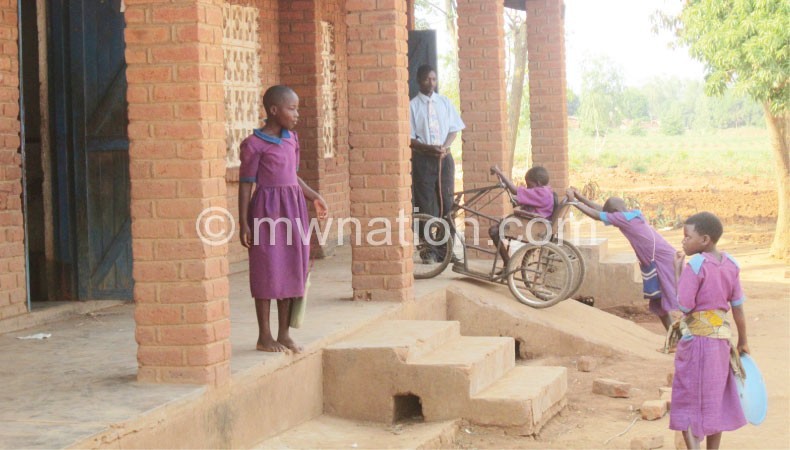Nkhata Bay ghost project: mute, dark-suited officials irk villagers
They arrived in dark suits, trudged around the premises, fiddled with their expensive smart phones and left—without a word.
They were Education Ministry officials apparently dispatched to Nkhata Bay on Saturday to defuse pressure among locals demanding answers to how K388 million allocated for expansion of St Augustine Secondary School did not reach the area.
 Ministry of Education, Science and Technology (MoEST) architect Baleke Kaunda and chief engineer James Chitete left the locals in suspense as they spent two hours at the school without uttering a word.
Ministry of Education, Science and Technology (MoEST) architect Baleke Kaunda and chief engineer James Chitete left the locals in suspense as they spent two hours at the school without uttering a word.
They were seen toying around with their tablet mobile gadgets throughout what was meant to be a situational analysis and pacifying meeting.
Irked locals demanded answers to numerous questions, especially how the school ended up receiving teaching and learning materials for newly completed learning and teaching facilities which are nowhere on the ground. But the duo offered no responses.
In 2006, government received a grant from the African Development Bank (AfDB) for creation of infrastructure that would lead to better learning environments.
However, the Nkhata Bay Central community were kept in the dark about construction of two teachers’ houses, four classroom blocks and three laboratories until 2010 when government visited the area to inspect new infrastructure that, however, only exists on paper.
The mystery hit a new low in 2011 when they received truckloads of laboratory equipment, desks, computers and photocopiers for the nonexistent facilities—a sight that the school management committee termed “infuriating and daylight robbery”.
Nkhata Bay Central Member of Parliament (MP) Ralph Mhone said he wants his constituents to “forget the past since Kaunda and Chitete had come to assess the site in readiness for construction of new facilities plus a girls’ hostel”.
But no assessment was done two days ago.
Having sat tight-lipped throughout the encounter with the irked population, the ministry officials, who refused to be interviewed or photographed, hurried into the head teacher’s office to sign a visitors’ book and sped off in a Toyota Prado, leaving behind a trail of dust.
Despite the promised new project, the disgruntled locals dubbed the visit “a waste of government resources”, saying it only worsened their dissatisfaction and anger.
“What is there to smile about when half the story has not been told?” asked Group Village Head Kamoza, wondering whether the MP was talking about a new project or just compensation for the hundreds of millions that never reached the community.
Last week, Minister of Education, Science and Technology Emmanuel Fabiano, who was hyped to grace the meeting, told Parliament that rising cost of goods were to blame for the stalling of construction in four of 30 schools earmarked for the African Development Fund (ADF) initiative.
But Area Development Committee chairperson Bright Chande-Mhone insisted: “We feel cheated and hardly convinced by the talk of a new project. Our stand is clear: We want our school, which only exists on paper. Things should be procured and construction must begin.”
The Catholic Commission for Justice and Peace in Mzuzu Diocese has been empowering the dwellers to stand up for their right to development through a Tilitonse-funded initiative for enhanced citizen participation for accountable and responsive governance.
The locals plan to stage a demonstration if they get no tangible response from MoEST this month.





